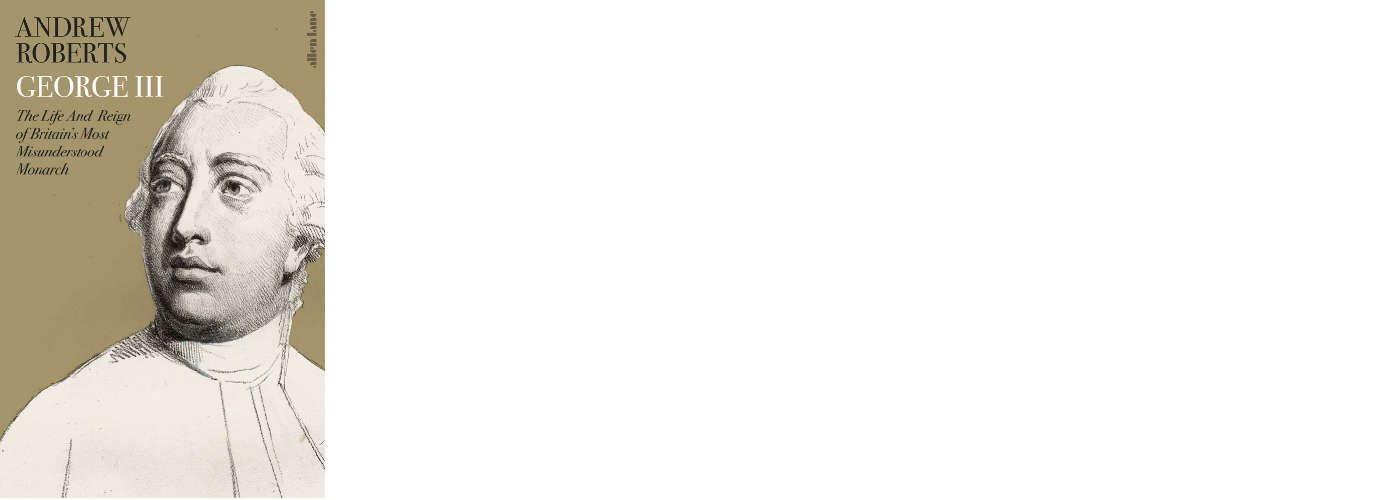Book of the week: George III by Andrew Roberts
In this mammoth and meticulous biography, Roberts presents a compelling case for the defence of King George III

A free daily email with the biggest news stories of the day – and the best features from TheWeek.com
You are now subscribed
Your newsletter sign-up was successful
Posterity hasn’t been kind to “poor” King George III, said Dominic Sandbrook in The Sunday Times. In Britain, he is remembered either as the “blundering oaf whose insensitivity lost the American colonies”, or as the “mad king” who once mistook an oak tree for the king of Prussia. In the US, he continues to be seen as the “cruel tyrant” whose tax demands drove the colonists to rebellion.
Yet in this mammoth and meticulous biography, Andrew Roberts presents a compelling case for the defence. George, he insists, was not remotely tyrannical; he was “well-meaning, hard-working, decent, dutiful, moral, cultured and kind”. If anything, he was slightly boring – he had no obvious vices (he rarely drank and was never unfaithful) and his “idea of fun was writing an article about farming”.
As for George’s mental health, Roberts has no truck with the common idea that his late-life insanity was caused by porphyria (a genetic blood disease). Instead, he thinks bipolar disorder was to blame.
The Week
Escape your echo chamber. Get the facts behind the news, plus analysis from multiple perspectives.

Sign up for The Week's Free Newsletters
From our morning news briefing to a weekly Good News Newsletter, get the best of The Week delivered directly to your inbox.
From our morning news briefing to a weekly Good News Newsletter, get the best of The Week delivered directly to your inbox.
Over the nearly 60 years of his reign (he ascended to the throne aged 22 in 1760), George III “did much to shape the monarchy as it is known today”, said Ruth Scurr in The Times. He purchased Buckingham House (now Palace); bought almost half the present Royal Collection of art; and configured the monarch’s “constitutional role in terms of duty, piety and virtue”.
The denigration of his character began early, and was carried out initially by his opponents in the “Old Whig” faction, which had dominated British politics since the Glorious Revolution. Never forgiving the king for opposing their hegemony, they sniped incessantly from the sidelines – the Whig historian Horace Walpole even cattily said of George’s choice of bride, Charlotte of Mecklenburg-Strelitz, that her “bloom of ugliness” started fading at 17.
The “big event” of George’s reign was, of course, America’s secession, said Tim Blanning in Literary Review. Roberts devotes around half his book to the topic. The War of Independence did not, he suggests, have much to do with taxation – the average American paid little tax, and it stayed in America. Rather, it was a question of “sovereignty, independence and self-government”. And it suited the colonists to portray themselves as victims of a “despotic tyrant”: that way they could “justify their illegal secession”.
This is not an account of American liberation that will recommend itself to patriotic American readers, but it’s bracing and “masterly”. With the publication of this superb biography, the rehabilitation of King George III has “come at last”.
A free daily email with the biggest news stories of the day – and the best features from TheWeek.com
Allen Lane 784pp £35; The Week Bookshop £27.99 (incl. p&p)

The Week Bookshop
To order this title or any other book in print, visit theweekbookshop.co.uk, or speak to a bookseller on 020-3176 3835. Opening times: Monday to Saturday 9am-5.30pm and Sunday 10am-4pm.
-
 Switzerland could vote to cap its population
Switzerland could vote to cap its populationUnder the Radar Swiss People’s Party proposes referendum on radical anti-immigration measure to limit residents to 10 million
-
 Political cartoons for February 15
Political cartoons for February 15Cartoons Sunday's political cartoons include political ventriloquism, Europe in the middle, and more
-
 The broken water companies failing England and Wales
The broken water companies failing England and WalesExplainer With rising bills, deteriorating river health and a lack of investment, regulators face an uphill battle to stabilise the industry
-
 A thrilling foodie city in northern Japan
A thrilling foodie city in northern JapanThe Week Recommends The food scene here is ‘unspoilt’ and ‘fun’
-
 Tourangelle-style pork with prunes recipe
Tourangelle-style pork with prunes recipeThe Week Recommends This traditional, rustic dish is a French classic
-
 Samurai: a ‘blockbuster’ display of Japan’s legendary warriors
Samurai: a ‘blockbuster’ display of Japan’s legendary warriorsThe Week Recommends British Museum show offers a ‘scintillating journey’ through ‘a world of gore, power and artistic beauty’
-
 BMW iX3: a ‘revolution’ for the German car brand
BMW iX3: a ‘revolution’ for the German car brandThe Week Recommends The electric SUV promises a ‘great balance between ride comfort and driving fun’
-
 Arcadia: Tom Stoppard’s ‘masterpiece’ makes a ‘triumphant’ return
Arcadia: Tom Stoppard’s ‘masterpiece’ makes a ‘triumphant’ returnThe Week Recommends Carrie Cracknell’s revival at the Old Vic ‘grips like a thriller’
-
 My Father’s Shadow: a ‘magically nimble’ love letter to Lagos
My Father’s Shadow: a ‘magically nimble’ love letter to LagosThe Week Recommends Akinola Davies Jr’s touching and ‘tender’ tale of two brothers in 1990s Nigeria
-
 Send Help: Sam Raimi’s ‘compelling’ plane-crash survival thriller
Send Help: Sam Raimi’s ‘compelling’ plane-crash survival thrillerThe Week Recommends Rachel McAdams stars as an office worker who gets stranded on a desert island with her boss
-
 Book reviews: ‘Hated by All the Right People: Tucker Carlson and the Unraveling of the Conservative Mind’ and ‘Football’
Book reviews: ‘Hated by All the Right People: Tucker Carlson and the Unraveling of the Conservative Mind’ and ‘Football’Feature A right-wing pundit’s transformations and a closer look at one of America’s favorite sports